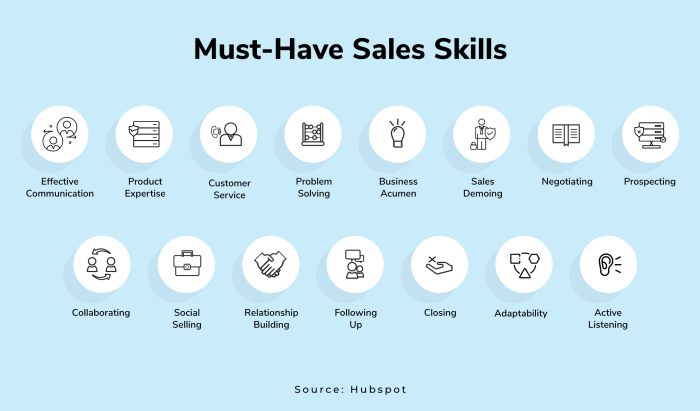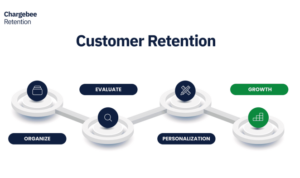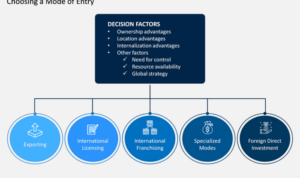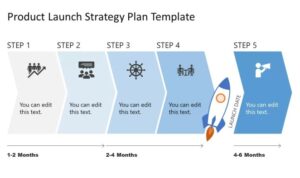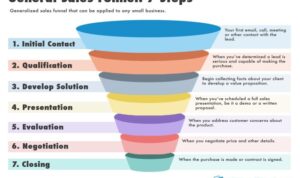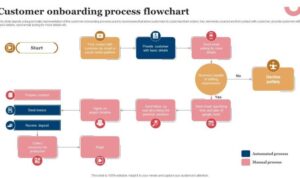Developing Sales Skills dives into the world of sales mastery, uncovering the secrets behind successful selling and the essential components that drive sales professionals to excellence.
From defining sales skills to exploring effective communication and negotiation tactics, this guide equips you with the tools needed to thrive in the competitive sales landscape.
Understanding Sales Skills
Sales skills are essential in the business world as they play a crucial role in driving revenue and building relationships with customers. These skills encompass a range of abilities that allow sales professionals to effectively communicate, persuade, and close deals. Successful sales professionals possess a combination of interpersonal, communication, and strategic skills that enable them to meet and exceed sales targets.
Key Components of Effective Sales Skills
- Effective Communication: Sales professionals must be able to articulate the value of their products or services clearly and persuasively to potential customers.
- Active Listening: Understanding the needs and concerns of customers requires active listening skills, enabling sales professionals to tailor their pitch accordingly.
- Problem-Solving: Being able to address customer objections and find solutions to meet their needs is crucial in closing sales.
- Resilience: Rejection is a common part of sales, and resilience is necessary to bounce back and continue pursuing leads.
Examples of Successful Sales Professionals
- Grant Cardone: Known for his motivational sales training programs, Grant Cardone is a successful sales professional who emphasizes persistence and a positive mindset in achieving sales goals.
- Mary Kay Ash: Founder of Mary Kay Cosmetics, Mary Kay Ash built a successful sales empire by empowering women to become independent sales representatives and providing them with the necessary tools and support to succeed.
- Jordan Belfort: The real-life inspiration behind the movie “The Wolf of Wall Street,” Jordan Belfort was a successful stockbroker known for his persuasive sales techniques and ability to close high-ticket deals.
Types of Sales Skills
In the world of sales, different types of skills are essential for success. Whether it’s communication, negotiation, or relationship-building, mastering these skills can make a huge difference in closing deals and building long-lasting connections with clients.
Communication Skills
Good communication skills are crucial in sales. Being able to effectively convey your message, listen actively to your client’s needs, and ask the right questions can help you build rapport and trust. Clear and concise communication can also help in overcoming objections and closing deals.
Negotiation Skills
Negotiation skills are key in navigating the give-and-take of sales transactions. Understanding the needs of both parties, finding common ground, and reaching mutually beneficial agreements are all part of effective negotiation. Being able to handle objections and pushback from clients is also an important aspect of negotiation skills.
Relationship-Building Skills
Building strong relationships with clients is essential for repeat business and referrals. Relationship-building skills involve creating trust, understanding your client’s needs, and providing excellent customer service. By cultivating meaningful connections, you can turn clients into loyal customers who come back to you for future purchases.
Soft Skills vs. Hard Skills in Sales: Developing Sales Skills
In sales, there is a distinction between soft skills, which are more interpersonal in nature, and hard skills, which are more technical or specific to the sales process.
Soft Skills
Soft skills in sales include communication, emotional intelligence, adaptability, and empathy. These skills help sales professionals build relationships, understand client needs, and navigate complex sales situations. Soft skills are essential for effective communication and building trust with clients.
Hard Skills, Developing Sales Skills
Hard skills in sales typically involve technical knowledge of products or services, sales techniques, and data analysis. These skills are more tangible and specific to the sales process, such as understanding pricing strategies, conducting market research, or using sales software effectively. Hard skills are crucial for executing sales strategies and closing deals efficiently.
Examples of Sales Skills in Action
– Communication skills: A salesperson effectively communicates the value of a product to a client, addressing their concerns and answering questions to close a sale.
– Negotiation skills: A sales professional negotiates a contract with a client, finding a middle ground that satisfies both parties and leads to a successful deal.
– Relationship-building skills: A sales representative maintains a strong relationship with a client, providing personalized service and follow-up to ensure repeat business and referrals.
Developing Communication Skills
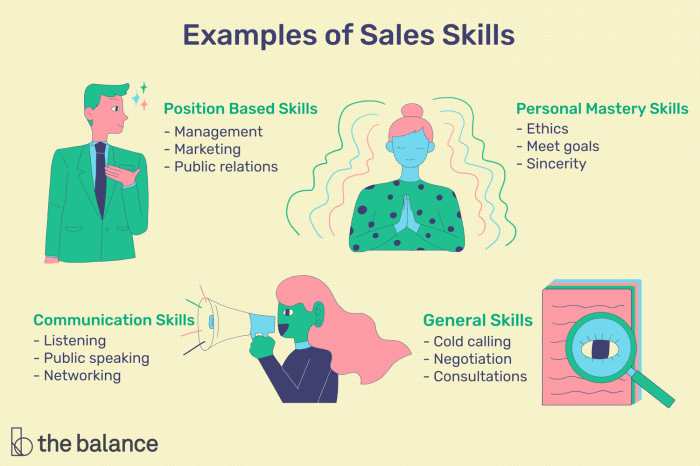
Effective communication skills are crucial in sales as they allow sales professionals to build rapport with customers, understand their needs, and convey the value of their products or services persuasively.
Improving Verbal and Non-verbal Communication
- Speak clearly and confidently to ensure that your message is understood.
- Use positive body language such as maintaining eye contact and smiling to establish trust.
- Pay attention to your tone of voice to convey enthusiasm and build excitement about the product.
- Practice active listening by focusing on the customer’s words, asking relevant questions, and providing thoughtful responses.
Enhancing Sales Conversations with Active Listening
Active listening is a powerful tool in sales that involves fully concentrating on what the customer is saying, understanding their needs, and responding appropriately. By actively listening, sales professionals can uncover valuable insights, address concerns effectively, and tailor their pitch to meet the customer’s specific requirements.
Enhancing Negotiation Skills
Negotiation skills play a crucial role in the sales process, as they determine the outcome of deals and relationships with customers. Effective negotiation can lead to win-win situations where both parties are satisfied with the final agreement. Without strong negotiation skills, sales professionals may struggle to close deals, resulting in lost opportunities and revenue.
Importance of Negotiation Skills
Negotiation skills are essential in sales because they allow for a mutually beneficial agreement between the seller and the buyer. By being able to effectively communicate, listen, and find common ground, sales professionals can build trust with customers and increase the likelihood of closing a sale. Without negotiation skills, salespeople may struggle to overcome objections, address customer concerns, and ultimately secure the deal.
- Active Listening: Paying attention to the customer’s needs and concerns is key to successful negotiation. This helps in understanding their perspective and finding common ground.
- Emotional Intelligence: Being aware of emotions, both yours and the customer’s, can help navigate difficult conversations and build rapport.
- Flexibility: Being open to different solutions and willing to make concessions can lead to a mutually beneficial agreement.
- Preparation: Researching the customer, understanding their needs, and knowing your product or service inside out can give you an edge in negotiations.
Strategies for Effective Negotiation in Sales
Effective negotiation in sales requires a combination of skills and strategies to achieve a successful outcome. Here are some key strategies to enhance your negotiation skills:
- Set Objectives: Clearly define your goals and objectives for the negotiation to stay focused and guide your decisions.
- Build Rapport: Establishing a connection with the customer can help create a positive atmosphere for negotiation and build trust.
- Focus on Value: Emphasize the value of your product or service and how it can address the customer’s needs to justify the price.
- Use Silence: Allow moments of silence to encourage the customer to speak and reveal more information, giving you an advantage in the negotiation.
Successful Negotiation Tactics in Sales Scenarios
Real-life examples of successful negotiation tactics in sales scenarios can provide valuable insights into effective strategies. Some common tactics include:
“Framing the Offer: Presenting options in a way that highlights the benefits and value, making it more appealing to the customer.”
“Bundling: Offering complementary products or services together can create a sense of value and incentivize the customer to agree to the deal.”
“Limited-time Offers: Creating a sense of urgency by offering limited-time discounts or promotions can encourage customers to make a decision quickly.”
Building Relationships in Sales
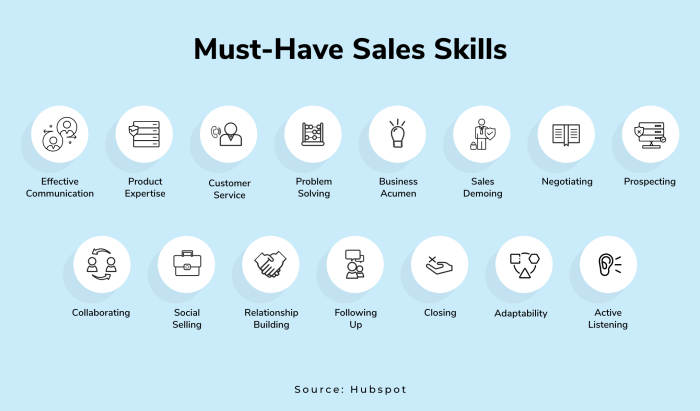
Building strong relationships with customers in sales is crucial for long-term success. By establishing trust and rapport with clients, sales professionals can create a loyal customer base that leads to repeat business and valuable referrals.
Techniques for Establishing Trust and Rapport
- Active listening: Paying attention to the client’s needs and concerns shows that you value their input.
- Personalization: Tailoring your approach to each client and showing genuine interest in their business builds trust.
- Consistent communication: Keeping clients informed and updated on progress helps maintain rapport.
- Follow-up: Checking in after a sale to ensure satisfaction and address any issues demonstrates commitment to the relationship.
Benefits of Long-Term Relationships
- Repeat business: Satisfied customers are more likely to return for future purchases, increasing sales revenue.
- Referrals: Happy clients are inclined to recommend your products or services to others, expanding your customer base.
- Reduced marketing costs: Building strong relationships can lead to word-of-mouth promotion, saving on advertising expenses.
